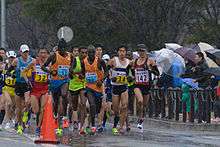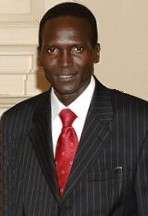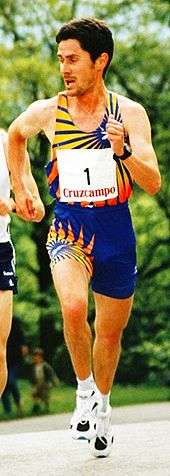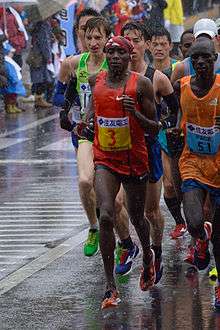Lake Biwa Marathon
The Lake Biwa Mainichi Marathon (びわ湖毎日マラソン, Biwako Mainichi Marason) is a marathon race held in Otsu, Shiga, Japan. It is one of the prominent marathons in Japan. It is a male only competition and has IAAF Gold Label status.[1] It was first held in 1946 and, having taken place every year since then, it is Japan's oldest annual marathon race.[2] The early editions of the race were held in Osaka until a switch to Tokyo occurred for the 1963–64 marathons, and all subsequent races thereafter were held in Shiga Prefecture, starting in Ōtsu fronting Lake Biwa, where the race gets its name. It is sponsored by Mainichi and was known simply as the Mainichi Marathon for a period.[3]
| Lake Biwa Marathon | |
|---|---|
 2015 Lake Biwa Marathon | |
| Date | Early March |
| Location | Ōtsu, Shiga, Japan |
| Event type | Road |
| Distance | Marathon |
| Primary sponsor | SEI K-Opticom Corporation (2010–) |
| Established | 1946 |
| Course records | 2:06:13 (2011) |
| Official site | Lake Biwa Marathon |
| Participants | 174 (2019) |
The race begins and ends at the Ojiyama Stadium.[1] The Lake Biwa Marathon has been selected as the Japanese national marathon championships on dozens of occasions, starting in 1960.[3] The current course record for the competition is 2:06:13 hours, set by Wilson Kipsang at the 2011 edition.[4]
Winners
Key: Course record Japanese championship race Asian Marathon Championship race



| Edition | Date | Winner | Time |
|---|---|---|---|
| 75th | 10 March 2019 | 2:07:29 | |
| 74th | 10 March 2019 | 2:07:52 | |
| 73rd | 4 March 2018 | 2:07:53 | |
| 72nd | 5 March 2017 | 2:09:06 | |
| 71st | 6 March 2016 | 2:09:11 | |
| 70th | 1 March 2015 | 2:09:08 | |
| 69th | 2 March 2014 | 2:09:10 | |
| 68th | 3 March 2013 | 2:08:34 | |
| 67th | 4 March 2012 | 2:07:04 | |
| 66th | 6 March 2011 | 2:06:13 | |
| 65th | 7 March 2010 | 2:09:34 | |
| 64th | 1 March 2009 | 2:10:22 | |
| 63rd | 2 March 2008 | 2:08:23 | |
| 62nd | 4 March 2007 | 2:10:43 | |
| 61st | 5 March 2006 | 2:09:15 | |
| 60th | 6 March 2005 | 2:09:00 | |
| 59th | 7 March 2004 | 2:07:42 | |
| 58th | 2 March 2003 | 2:07:39 | |
| 57th | 3 March 2002 | 2:08:35 | |
| 56th | 4 March 2001 | 2:07:34 | |
| 55th | 5 March 2000 | 2:08:14 | |
| 54th | 7 March 1999 | 2:08:50 | |
| 53rd | 1 March 1998 | 2:08:43 | |
| 52nd | 2 March 1997 | 2:08:05 | |
| 51st | 3 March 1996 | 2:09:32 | |
| 50th | 19 March 1995 | 2:10:49 | |
| 49th | 6 March 1994 | 2:11:05 | |
| 48th | 14 March 1993 | 2:11:01 | |
| 47th | 15 March 1992 | 2:13:15 | |
| 46th | 10 March 1991 | 2:11:34 | |
| 45th | 11 March 1990 | 2:13:03 | |
| 44th | 12 March 1989 | 2:14:31 | |
| 43rd | 13 March 1988 | 2:12:41 | |
| 42nd | 8 March 1987 | 2:11:08 | |
| 41st | 9 March 1986 | 2:14:55 | |
| 40th | 10 March 1985 | 2:11:04 | |
| 39th | 11 March 1984 | 2:14:24 | |
| 38th | 13 March 1983 | 2:13:22 | |
| 37th | 14 March 1982 | 2:15:23 | |
| 36th | 15 March 1981 | 2:14:38 | |
| 35th | 23 March 1980 | 2:14:33 | |
| 34th | 15 April 1979 | 2:13:26 | |
| 33rd | 23 April 1978 | 2:15:15 | |
| 32nd | 17 April 1977 | 2:14:08 | |
| 31st | 18 April 1976 | 2:15:22 | |
| 30th | 20 April 1975 | 2:12:40 | |
| 29th | 21 April 1974 | 2:13:24 | |
| 28th | 18 March 1973 | 2:12:03 | |
| 27th | 19 March 1972 | 2:20:24 | |
| 26th | 21 March 1971 | 2:16:45.4 | |
| 25th | 12 April 1970 | 2:13:46 | |
| 24th | 11 May 1969 | 2:22:44 | |
| 23rd | 14 April 1968 | 2:13:49 | |
| 22nd | 14 May 1967 | 2:25:53 | |
| 21st | 5 June 1966 | 2:26:01.6 | |
| 20th | 9 May 1965 | 2:22:55.8 | |
| 19th | 12 April 1964 | 2:17:11.4 | |
| 18th | 12 May 1963 | 2:20:24.8 | |
| 17th | 13 May 1962 | 2:27:37 | |
| 16th | 25 June 1961 | 2:29:27 | |
| 15th | 15 May 1960 | 2:34:57 | |
| 14th | 10 May 1959 | 2:30:06 | |
| 13th | 11 May 1958 | 2:25:51 | |
| 12th | 3 May 1957 | 2:31:20 | |
| 11th | 6 May 1956 | 2:27:45 | |
| 10th | 8 May 1955 | 2:26:32 | |
| 9th | 16 May 1954 | 2:27:56 | |
| 8th | 10 May 1953 | 2:41:28 | |
| 7th | 4 May 1952 | 2:29:54.4 | |
| 6th | 6 May 1951 | 2:32:41 | |
| 5th | 7 May 1950 | 2:37:25 | |
| 4th | 4 May 1949 | 2:40:32 | |
| 3rd | 9 May 1948 | 2:40:05 | |
| 2nd | 18 May 1947 | 2:43:17 | |
| 1st | 10 February 1946 | 2:44:57 |
Statistics
Winners by country
|
Multiple winners
|
Qualifications
The runners need to meet both of the following requirements, or have a special recommendation from the JAAF, to enter the competition. 1, The runner must be at least 19 years old on the day of competition. 2, The runner should have achieved one of the following time within two years from the date of the competition.
- (1)Marathon: 2 hours 30 minutes or less
- (2)Half Marathon: 1 hour 10 minutes or less
- (3)30km: 1 hour 40 minutes or less
- (4)20km: 1 hour 5 minutes or less
- (5)10000m: 31 minutes or less
References
- Nakamura, Ken (2010-03-07). Tsegay takes Lake Biwa crown. IAAF. Retrieved on 2010-03-08.
- Nakamura, Ken (2010-03-05). Course record in jeopardy at Lake Biwa Marathon? - Preview. IAAF. Retrieved on 2010-03-08.
- Biwa-ko Mainichi Marathon. Association of Road Racing Statisticians. Retrieved on 2010-02-08.
- Nakamura, Ken (2011-03-06). 2:06:13 course record for Kipsang at Lake Biwa. IAAF. Retrieved on 2011-03-06.
